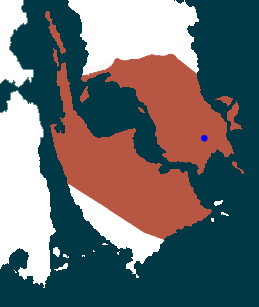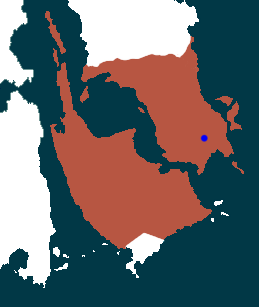Imperial State of Carinansia
Jump to navigation
Jump to search
Imperial State of Carinansia Estado Imperial de Cárinansia | |||||||||
|---|---|---|---|---|---|---|---|---|---|
| 1827–1965 | |||||||||
| Motto: Patria, Fraternidad, y Honor | |||||||||
| Anthem: Cárinansia Suprema | |||||||||
 Map of Carinansia in 1827 | |||||||||
 Map of Carinansia in 1965 | |||||||||
| Capital | São Alberto | ||||||||
| Common languages |
| ||||||||
| Religion |
| ||||||||
| Demonym(s) | Cárinansian | ||||||||
| Government |
| ||||||||
| Emperor | |||||||||
• 1827-1841 | Alberto I | ||||||||
• 1841-1857 | Alberto II | ||||||||
• 1857-1899 | Alberto III | ||||||||
• 1899-1939 | Alberto IV | ||||||||
• 1939-1965 | Alberto V | ||||||||
| Prime Minister | |||||||||
• 1908-1913 | Matías Sarmiento | ||||||||
• 1919-1920 | Lord Rolando Arboleda | ||||||||
• 1920-1932 | Franco Manzanedo | ||||||||
• 1932-1936 | Gonzalo Tejedor | ||||||||
• 1936-1941 | Juan Hurtado | ||||||||
| Legislature | Imperial Congress | ||||||||
| Imperial Senate | |||||||||
| House of Deputies | |||||||||
| Historical era | 1827 - 1965 | ||||||||
• Established | 16 June 1827 | ||||||||
• Arcadian Invasion of Lekeadia | 1842-1843 | ||||||||
• Promulgation of the People’s Constitution | 9 August 1908 | ||||||||
• The Distopia | 1945-1965 | ||||||||
• Disestablished | 14 June 1965 | ||||||||
| Population | |||||||||
• 1835 | 7,400,000 | ||||||||
• 1875 | 27,800,000 | ||||||||
• 1905 | 44,200,000 | ||||||||
• 1935 | 51,900,000 | ||||||||
• 1965 | 55,400,000 | ||||||||
| Currency | Imperial Peso | ||||||||
| |||||||||
| Today part of | Carinansia | ||||||||
| |||||||||
The Imperial State of Cárinansia was a state in Suroikoia that existed between 1827 and 1965. Gaining independence from the Arcadian Empire, then-Viscount Sextus was chosen by the Imperial Congress to serve as the country’s first Emperor, ultimately becoming Alberto I. His descendants would rule the country until the dissolution of the Imperial State in 1965 under Alberto V.